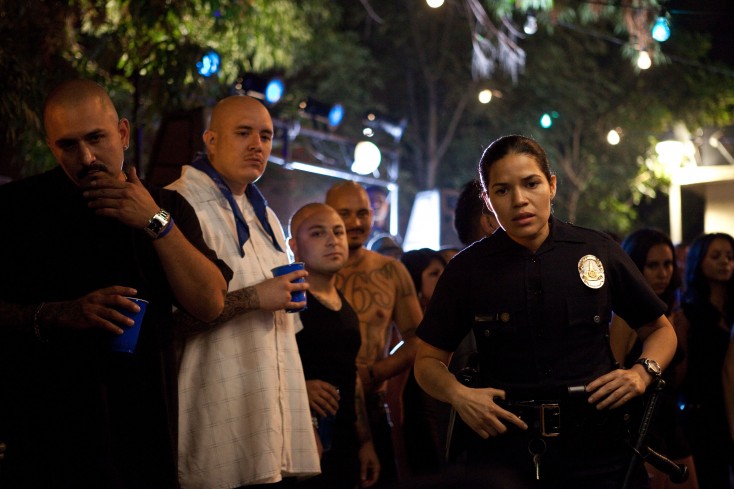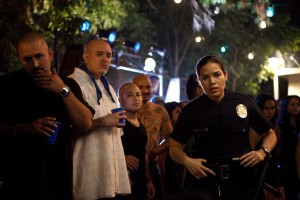By ANGELA DAWSON
Front Row Features
HOLLYWOOD—Growing up in the Los Angeles suburbs, America Ferrera and her large family lived far away from the crime-infested wretchedness of the inner city. Yet the petite Latina was keenly aware of the racial tensions that existed in the City of Angels. Though she was only a youngster during the L.A. riots, Ferrera recalls watching in horror the violence and destruction taking place just miles from her unscathed home.
Now 28, Ferrera has made a career out of making people smile, bridging the gap between the cultures and serving as a role model to young Hispanic-Americans through her acting. Most notably, the petite brunette starred for four seasons in the TV comedy “Ugly Betty.”
The curvy (and proud!) actress also has a number of screen credits to her name including starring roles in “Real Women Have Curves” and “The Sisterhood of the Traveling Pants” adaptations. She also voiced Astrid the Viking in the hit animated feature “How To Train Your Dragon.”
In her newest role, Ferrera trots out her dramatic chops, playing a patrol officer in one of the toughest neighborhoods in L.A. in “End of Watch.” While Jake Gyllenhaal and Michael Pena are the main focus of the gritty police drama, written and directed by “Training Day” writer David Ayer, Ferrera holds her own in a supporting role as a colleague in the same unit.
Not one to take on any role lightly, Ferrera hung out with actual members of the LAPD to prepare for her role. She also, at the encouragement of her director, did some boxing to get into top shape.
A newlywed—she married longtime boyfriend actor Ryan Piers Williams last year—Ferrera spoke by phone from Canada, where she is promoting her new movie at the Toronto International Film Festival.
Front Row Features: How did you like playing a Los Angeles police officer and did you meet actual policemen and policewomen to prepare for you role?
Ferrera: Yes. This was very a very research heavy role and completely different from anything else I’d ever done. (Writer-director) David Ayer asked everyone in the film to throw themselves into the world (of LAPD) and the environment. So several months before we started filming he asked me to start boxing because he thought my character was a boxer. He asked us to do learn mixed martial arts and we did days the police academy training and then we did ride-alongs with officers, both female and male. Cody Horn, who played my partner in the film, and I spent a lot of time together riding along with cops (on patrol).
Front Row Features: Were you ever exposed to the dangerous side of L.A.?
Ferrera: I went to USC (University of Southern California near downtown L.A.) for college so I lived in the area and was aware of the issues that exist in the area, crime-wise. I grew up in L.A. so I was aware (of tensions) when the L.A. riots broke out and I definitely knew there was an area of Los Angeles that was a lot less safe than the rest of it, but I think the issues that exist in the community depicted in the film are issues that exist everywhere, though maybe not to that volume. Drugs, guns and violence weren’t in the area that grew up in.
Front Row Features: When you were kid growing up, did you ever toy with the idea of being a cop or detective? Or were you pretty much focused on acting from the get-go?
Ferrera: I knew very early on I wanted to be an actress. Sometimes I toyed with becoming a veterinarian or a lawyer but I don’t think I ever saw myself becoming a cop. My older sister was a cop for many years and she was very good at it. It’s definitely not something I ever saw myself doing in real life but I definitely imagined playing one. And now I’ve done that.
Front Row Features: Do you think there’s a story to be told from the female officers’ perspective, those that put themselves in dangerous situations in these rough precincts?
Ferrera: Absolutely. I would love to see that. I definitely felt like the women’s roles as officers was different from the mens’ roles as officers and what we heard echoed over and over again from these women officers was that to be successful they have to pretend to be men. They had to be what they were good at. Sometimes that was the traditional physical presence. A lot of times it was bringing a completely different version of problem-solving and de-escalating a dangerous situation than a lot of the male officers don’t do. A lot male cops we spoke to said that their best partners were female cops because they brought something different to the job and to the role. That’s not to say they don’t have to deal with issues of prejudice or that they didn’t have a lot of prejudices to overcome. So I think there’s something different to be said from the female point of view.
Front Row Features: What do you think the message or theme David was trying to get across in this film?
Ferrera: Ultimately, it’s about the friendship between Jake and Mike’s characters, and the idea that this is a profession where their lives are at stake on a daily basis, and their families are at stake and their friendship grows out of their work. It’s a character-driven story. Yes, there’s action, but at the end of the day, it’s about friendship, a partnership that comes out of demanding work.
Front Row Features: You bounce between TV, theater and film roles. Do you have a preference at this point?
Ferrera: I don’t have a preference. I enjoy all of them. I get something different out of each experience and I might actually be doing some theater next up. Between theater, film and television, they all require very different things and I enjoy all them. It would be wonderful to continue to do all of them and not have to choose.
Front Row Features: How do you feel about “Ugly Betty” now that the show is behind you?
Ferrera: It was amazing. I’m so grateful it was in my life. It will always be just amazing memories for me.
Front Row Features: Did the show change your life?
Ferrera: In so many ways, yes. It changed my life but, at the same time, I grew up on that show. So much happens and changes when you’re between the ages of 21 and 26. I’m sure I still have more growing up to do but just learning about myself and my wants and what I want out of my career and what I want out of my life. I was really spoiled because I really loved this show and could come to work every day, even on the most exhausted days where I didn’t think that I had any more to give. When you start from a very pure place of love, it’s automatic. Your body just does it for you. All of a sudden I’m like “I’m so tired I can’t talk,” and then 10 minutes later, I’m arguing passionately about why I think it should be done this way because this is who Betty is. You start from a place of true passion and then it just sort of does the work for you. I just learned that that really paid off; that I believed in it and made the decision based on truly believing in the character and the story. It really made those four years of my life very rewarding.
Front Row Features: You’re a role model in the Hispanic-American community. Did you get a chance to watch the Democratic and GOP conventions? Is politics and government something that interests you?
Ferrera: Yes! I was just at the Democratic National Convention in North Carolina right before I flew to Toronto for the film festival. I also watched the Republican convention on TV. I’m doing work with Voto Latino, which is a nonpartisan organization that’s involved with encouraging voter registration and political participation in the Latino community. The Hispanic vote obviously is a very big topic of discussion this presidential election.






